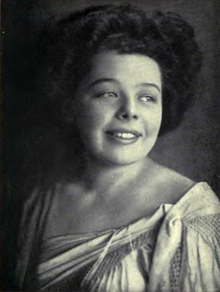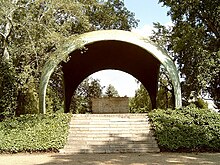Mihály Károlyi
Mihály Károlyi [ ˈmihaːj ˈkaːroji ], full name: Mihály (Michael) Adam Georg Nikolaus Count Károlyi von Nagykároly (born March 4, 1875 in Budapest , † March 20, 1955 in Vence near Nice , France ) was a Hungarian politician who served as Prime Minister Proclaimed the Republic of Hungary in 1918.
Life
origin
Mihály was the offspring of one of the oldest and richest aristocratic families in Hungary. He grew up appropriately and learned several languages, English , French and Italian , but suffered from a congenital language disorder. His main language was German , while he never fully mastered the written language of Hungarian . The young aristocrat led a dissolute life between Paris , London , Vienna and Budapest. He spent the winter months with his uncle in Menton on the French Riviera. Until his marriage in 1914 to Katinka Andrássy (1892–1985), the almost 20 years younger stepdaughter of the magnate Gyula Andrássy (1860–1929), he lost huge sums of money as a card player , so that his debts reached 12 million crowns .
Politics until 1914
Károlyi began his political career in the conservative camp, from which he soon broke away. In 1909 he became president of the Hungarian Agricultural Association (OMGE) and in 1913 leader of the opposition United Independence Party . Before 1914, Hungarian politics was seen as the playing field for only four noble politicians: Károlyi, Tisza , Apponyi and Andrássy. The political disputes among the magnates even escalated on January 2, 1913, in a saber duel between Károlyi and Tisza. Both were slightly injured.
With his party, Károlyi sought greater independence for Hungary in the form of a pure personal union with Austria and was in favor of universal suffrage , better social policy and land reform . In 1914, on a lecture tour through the United States, he promoted his concept of a federalization of Hungary under democratic conditions.
First World War
Even before the outbreak of World War I , Károlyi was considered an Entente- friendly politician. Under the impact of the war, he almost became a pacifist . During the war, Károlyi and his opposition left independence party wanted an annexless peace that would secure the territorial integrity of Austria-Hungary . Károlyi even saw a necessary (special) peace, in which Austria ceded the Trentino , part of Galicia and Bukovina , a strengthening of the superior power of Hungary over the weakened part of the Austrian Empire.
In autumn 1917 he presented his ideas to neutral Switzerland . His foreign policy orientation was in stark contrast to the line of most Hungarian magnates and led to a break with them. In July 1916, he resigned from the Independence Party with 23 other MPs when the government switched to war and founded the New Independence Party . With other parties ( Democratic Party and Social Democrats and bourgeois radicals ) the electoral rights bloc was set up in June 1917 . On October 25, 1918, Károlyi's party formed the Hungarian National Council with the bourgeois radicals and the Social Democrats .
government
On the night of October 31, 1918, military units that had joined the National Council occupied the capital Budapest as part of the bourgeois " aster revolution ". King Charles IV then had to appoint Károlyi as prime minister against the resistance of the old Hungarian ruling class around Andrássy. On October 31, Hungary ended the Real Union with Austria. After King Karl renounced (but not formally abdicated) any share in state affairs in Hungary on November 13, 1918, the Károlyi government proclaimed the Republic of Hungary on November 16, 1918. Freedom of speech and universal suffrage for men and women were enshrined in their constitution.
On January 11, 1919, Károlyi was elected President of the Republic by the National Council. He formed a socialist-bourgeois government. However, his room for maneuver was extremely small, since the ceasefire agreement was not adhered to by Czechoslovak , Romanian , Serbian and especially French troops. The situation was hopeless for Hungary, so that all important reform projects such as land reform or a new electoral law ultimately fell by the wayside. Károlyi nevertheless led the way with the land reform and began personally on 23 February 1919 with the land distribution on his property in Kál and Kápolna , which comprised 30,000 hectares .
The main task of his government was to take measures against looting and to set up a republican army from the old kuk army, which was in the process of being dissolved . Negotiations about the transformation of Hungary into a federal state took place too late as the nationalities were already in the process of joining the neighboring states. At the same time, conservative and right-wing forces rallied.
With the Vix Note on March 20, 1919, the Allies ordered a further retreat of the Hungarians to new demarcation lines in the south-east, which also separated Magyar-populated areas and from the French Lieutenant Colonel Fernand Vix , the head of the Allied military mission in Budapest, as the final political border was designated. A storm of indignation broke out and Károlyi was forced to resign on March 21st.
The beneficiary of the chaotic conditions was the small Communist Party of Béla Kun , which had made a pact with the Social Democrats. Károlyi passed power to the Revolutionary Council formed by Social Democrats and Communists . This proclaimed the Hungarian Soviet Republic and in a short time formed a powerful army.
exile
Károlyi did not distance himself from the Soviet Republic, but left the country in July 1919 and went to Prague . He later moved to Yugoslavia , where he lived on the Dalmatian coast. Further stations in exile were Paris and London.
In the late 1920s and early 1930s he then worked closely with the Hungarian Communist Party, which earned him the nickname Red Count or Count of the Comintern . The Horthy regime charged him with treason and confiscated his property. In February 1946, the freely elected Hungarian parliament rehabilitated him. From 1947 he was still the Hungarian ambassador in Paris, an office which he resigned in 1949 in protest against Stalinism in his homeland.
In 1955 Károlyi died in exile in France. In 1961, János Kádár allowed his remains to be buried on the Kerepesi temető in Budapest. For the publicist and Hungarian historian Paul Lendvai he was a "sincere idealist without statesmanlike abilities".
Fonts
- Against a whole world. My struggle for peace. Verlag für Kulturpolitik, Munich 1924.
- Memoirs of Michael Karolyi. Faith without illusion. Published by Dutton, New York 1956.
literature
- Holger Fischer: Oszkár Jászi and Mihály Károlyi. A contribution to the nationality politics of the bourgeois-democratic opposition in Hungary from 1900 to 1918 and its realization in the bourgeois-democratic government from 1918 to 1919. Verlag Trofenik, Munich 1978, ISBN 3-87828-130-7
- Éva Haraszti : Michael Károlyi. A friend , in: Chris Wrigley (Ed.): Warfare, diplomacy and politics: essays in honor of AJP Taylor . London: Hamilton, 1986, pp. 231-246 ( Alan JP Taylor )
- Endre Koczó: Count Mihály Károlyi, the national liberal opposition politician. Unprinted dissertation, Vienna 1975
- Paul Lendvai : The Hungarians - A Millennial History. Goldmann Verlag, Munich 2001, ISBN 3-442-15122-8
- Géza Vermes: Károlyi, Mihály Graf . In: Biographical Lexicon on the History of Southeast Europe . Volume 2. Munich 1976, pp. 375-377
Web links
- Literature by and about Mihály Károlyi in the catalog of the German National Library
- Newspaper article about Mihály Károlyi in the 20th century press kit of the ZBW - Leibniz Information Center for Economics .
- Biography at Austrian commander (English)
- Biography at firstworldwar.com (English)
Individual evidence
- ↑ after other deliveries also on March 18th, 19th or 21st
- ^ Paul Lendvai : The Hungarians. A thousand years of victory in defeat . Publisher Hurst, London 2003, p. 361
- ^ Paul Lendvai: The Hungarians. A thousand years of victory in defeat . Publisher Hurst, London 2003, p. 361
- ^ Mihály Károlyi: Against a whole world. My struggle for peace. Verlag für Kulturpolitik, Munich 1924, p. 37.
- ↑ József Galántai: The fall of the Tisza government in 1917 . In: Annales Universitatis Scientiarum Budapestinensis de Rolando Eötvös nominatae. Sectio historica 5 (1965) pp. 127–145, here: p. 129.
- ^ Paul Lendvai: The Hungarians. A thousand years of victory in defeat . Hurst Verlag, London 2003, pp. 361-362
- ^ Leo Valiani: The End of Austria-Hungary . Publisher Secker & Warburg , London 1973, p 126
- ^ Paul Lendvai: The Hungarians. A thousand years of victory in defeat . Hurst Verlag, London 2003, p. 363
- ^ Paul Lendvai: The Hungarians. A thousand years of victory in defeat . Hurst Verlag, London 2003, pp. 364-365
- ^ Paul Lendvai: The Hungarians. A thousand years of victory in defeat . Verlag Hurst, London 2003, p. 365f.
- ↑ Peter F. Sugar (Ed.): A history of Hungary. Indiana University Press, Bloomington 1990, pp. 302-303 and Paul Lendvai: The Hungarians. A thousand years of victory in defeat . Publisher Hurst, London 2003, p. 367.
- ^ Paul Lendvai: The Hungarians - A Thousand Year History. Goldmann, Munich 2001
| personal data | |
|---|---|
| SURNAME | Károlyi, Mihály |
| ALTERNATIVE NAMES | Mihály Adam Georg Nikolaus Count Károlyi of Nagykároly |
| BRIEF DESCRIPTION | Hungarian politician |
| DATE OF BIRTH | March 4, 1875 |
| PLACE OF BIRTH | Budapest |
| DATE OF DEATH | March 20, 1955 |
| Place of death | Vence near Nice , France |





